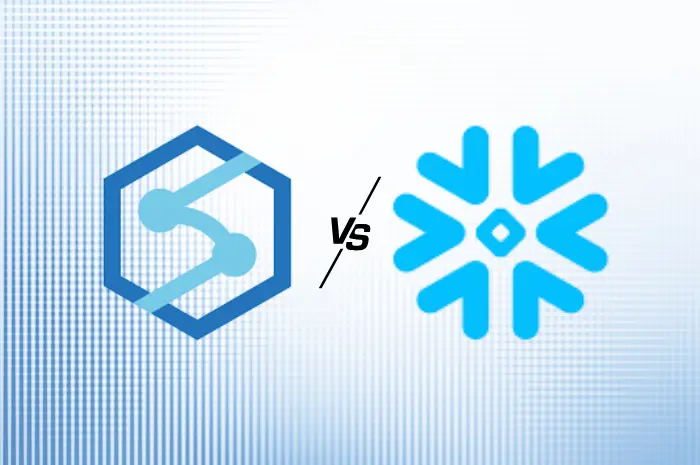As businesses continue to grow, their data stock also increases. With no proper data warehouse at its disposal, managing such a huge amount of data is troublesome and incurs high costs. Snowflake and Azure Synapse are the two popular data warehouses that have always competed. Both are dominating their respective markets, meeting end-to-end business needs quickly. But are both suitable for your business? Which one should you choose?
What is Snowflake?
Snowflake is a cloud-based data warehousing platform designed to handle large volumes of data and enable advanced analytics. It offers a unique architecture that decouples storage and computing, allowing users to scale resources independently. Snowflake provides a fully managed service, eliminating the need for infrastructure management and enabling organizations to focus on data analysis. With its built-in data-sharing capabilities and support for various data integration tools, Snowflake has gained popularity as a flexible and scalable data warehousing and analytics solution.
What is Azure Synapse?
Synapse, previously known as Azure SQL Data Warehouse, is a cloud-based analytics service provided by Microsoft Azure. It combines data integration, data warehousing, and big data processing into a unified platform. Azure Synapse integrates seamlessly with other Azure services, offering a comprehensive ecosystem for data management and analytics. It leverages distributed SQL engine technology to process large datasets efficiently and provides a unified workspace for data engineers, data scientists, and business analysts to collaborate and derive insights from the data.
Comparing Snowflake vs Azure Synapse
Architecture:
Snowflake follows a cloud-native architecture, utilizing a separation of computing and storage. It enables independent scaling of compute and storage resources, allowing users to scale their data warehouse up or down as needed.
Azure Synapse also offers a distributed architecture with separate compute and storage layers. It leverages the Azure ecosystem and integrates with various Azure services.
Result: Snowflake’s separation of computing and storage provides more flexibility and better cost optimization. Snowflake is considered the best in this aspect.
Scalability:
Snowflake offers automatic scalability with its multi-cluster architecture. It dynamically scales resources to handle concurrent workloads, ensuring optimal performance. It provides virtually unlimited storage capacity.
Azure Synapse provides on-demand scalability and allows users to provision additional compute resources to handle varying workloads. It offers scalability through the concept of Data Warehouse Units (DWUs) that can be scaled up or down as needed.
Result: Snowflake is considered the better option for its automatic scalability and seamless resource management.
Performance:
Snowflake’s unique architecture and optimization techniques contribute to its high performance. It separates storage and computing, enabling efficient data processing. Snowflake also utilizes a technique called instant cloning to rapidly create copies of data for faster querying.
Azure Synapse utilizes distributed query processing to achieve high-performance analytics. It optimizes query execution by parallelizing operations across multiple compute resources.
Result: It is difficult to determine a clear winner in this aspect as the choice between them may depend on specific use cases and workload patterns.
Integration:
Snowflake provides integration with various data integration tools, such as Informatica, Talend, and Matillion. It also supports popular BI tools like Tableau and Power BI for data visualization.
As part of the Azure ecosystem, Azure Synapse seamlessly integrates with other Azure services like Azure Data Factory, Azure Data Lake Storage, and Azure Analysis Services. It also supports integration with Power BI and other BI tools.
Result: Both platforms offer robust data integration capabilities, but Azure Synapse’s tight integration with Azure Data Factory and the Azure ecosystem gives it an edge. Azure Synapse is considered the best in this aspect.
Security:
Snowflake incorporates robust security measures, including encryption at rest and in transit, granular access controls, and multi-factor authentication. It complies with various industry regulations like GDPR and HIPAA.
Azure Synapse provides comprehensive security features, including encryption, firewall rules, and Azure Active Directory integration. It also supports advanced threat detection and auditing capabilities.
Result: No clear winner in this aspect.
Cost:
Snowflake offers a consumption-based pricing model, where users pay for the storage and compute resources they use. It provides options for different performance tiers and allows users to optimize costs based on their workload requirements.
Azure Synapse pricing is based on a combination of provisioned compute resources (DWUs) and storage consumption. Users can scale up or down their DWUs to manage costs effectively.
Result: The cost comparison depends on various factors such as usage patterns, data volume, and specific requirements. It’s challenging to determine a clear winner in this aspect.
Azure Synapse vs Snowflake: Which Should I Choose?
In the Snowflake vs. Azure Synapse showdown, there is no clear winner. Both platforms offer robust data warehousing capabilities and cater to different organizational needs. Snowflake excels in scalability, flexibility, and simplicity, while Azure benefits from its seamless integration with the Microsoft ecosystem and advanced analytics features.
To make an informed decision, it is crucial to evaluate your organization’s workload complexity, integration requirements, scalability needs, and budget considerations. Consider conducting a thorough evaluation of your data ecosystem, including existing infrastructure, analytics tools, and team expertise.
FAQs
Is Snowflake better than Azure Synapse?
Snowflake and Azure Synapse have distinct features and strengths. Snowflake is known for its scalability, flexibility, and ease of use, making it an excellent choice for data warehousing and analytics workloads. On the other hand, Azure Synapse combines data warehousing, big data processing, and data integration capabilities within the broader Azure ecosystem, providing seamless integration with other Azure services.
Is Azure Synapse an ETL tool?
While Azure Synapse incorporates ETL (Extract, Transform, Load) capabilities, it is not solely an ETL tool. Azure Synapse is a comprehensive cloud-based analytics service that combines data warehousing, big data processing, and data integration functionalities. It allows organizations to ingest, prepare, manage, and analyze large volumes of structured and unstructured data. Azure Synapse supports various data integration patterns, including ELT (Extract, Load, Transform), and provides tools and features for data movement, transformation, and orchestration. Therefore, while Azure Synapse offers ETL capabilities, it encompasses a broader scope of functionalities beyond traditional ETL.
Is Azure Synapse PaaS or SaaS?
Azure Synapse is a Platform as a Service (PaaS) offering from Microsoft Azure. PaaS refers to a cloud computing model where a platform, including infrastructure and tools, is provided as a service to develop, run, and manage applications. Azure Synapse provides a fully managed and integrated platform for data analytics, combining data warehousing, big data processing, and data integration capabilities. It abstracts the underlying infrastructure complexities and allows organizations to focus on data analysis and insights without the need to manage the infrastructure aspects of the platform.







